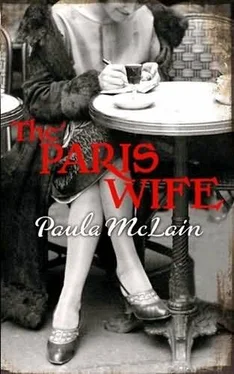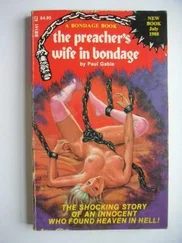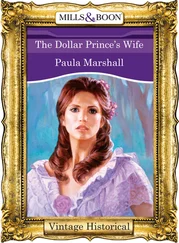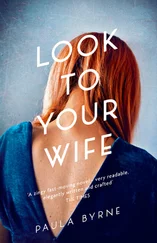
Paula McLain
The Paris Wife
© 2011
It is not what France gave you but what it did not take from you that was important.
– GERTRUDE STEIN
There’s no one thing that’s true. It’s all true.
– ERNEST HEMINGWAY
Though I often looked for one, I finally had to admit that there could be no cure for Paris. Part of it was the war. The world had ended once already and could again at any moment. The war had come and changed us by happening when everyone said it couldn’t. No one knew how many had died, but when you heard the numbers-nine million or fourteen million-you thought, Impossible . Paris was full of ghosts and the walking wounded. Many came back to Rouen or Oak Park, Illinois, shot through and carrying little pieces of what they’d seen behind their kneecaps, full of an emptiness they could never dislodge. They’d carried bodies on stretchers, stepping over other bodies to do it; they’d been on stretchers themselves, on slow-moving trains full of flies and the floating voice of someone saying he wanted to be remembered to his girl back home.
There was no back home anymore, not in the essential way, and that was part of Paris, too. Why we couldn’t stop drinking or talking or kissing the wrong people no matter what it ruined. Some of us had looked into the faces of the dead and tried not to remember anything in particular. Ernest was one of these. He often said he’d died in the war, just for a moment; that his soul had left his body like a silk handkerchief, slipping out and levitating over his chest. It had returned without being called back, and I often wondered if writing for him was a way of knowing his soul was there after all, back in its place. Of saying to himself, if not to anyone else, that he had seen what he’d seen and felt those terrible things and lived anyway. That he had died but wasn’t dead anymore.
One of the best things about Paris was coming back after we’d gone away. In 1923 we moved to Toronto for a year to have our son, Bumby, and when we returned, everything was the same but more somehow. It was filthy and gorgeous, full of rats and horse chestnut blossoms and poetry. With the baby our needs seemed to double, but we had less to spend. Pound helped us find an apartment on the second floor of a white stucco building on a tight curving street near the Luxembourg Gardens. The flat had no hot water, no bathtub, no electric lighting-but it wasn’t the worst place we’d lived. Not by a long shot. Across the courtyard, a sawmill buzzed steadily from seven in the morning until five at night, and there was always the smell of fresh cut wood, and sawdust filtered in under the windowsills and door frames and got in our clothes and made us cough. Inside, there was the steady report of Ernest’s Corona in the small room upstairs. He was working on stories-there were always stories or sketches to write-but also a new novel about the fiesta in Pamplona that he’d started in the summer.
I wasn’t reading the pages then, but I trusted his feeling about them and trusted the rhythm of every day. Each morning, he’d wake early and dress and then go upstairs to his room and begin the day’s writing. If things weren’t hitting for him there, he’d take the notebooks and several well-sharpened pencils and walk to the Closerie des Lilas for a café crème at the marble table he liked best while Bumby and I breakfasted alone, and then dressed for a walk or went out to see friends. In the late afternoon, I’d head home, and if the day had gone well, Ernest would be there at the dining table looking satisfied with some nice cold Sauternes or brandy and seltzer, and ready to talk about anything. Or we would go out together, leaving Bumby with our landlady, Madame Chautard, and find a plate of fat oysters and good talk at the Select or the Dôme or the Deux Magots.
Interesting people were everywhere just then. The cafés of Montparnasse breathed them in and out, French painters and Russian dancers and American writers. On any given night, you could see Picasso walking from Saint-Germain to his apartment in the rue des Grands Augustins, always exactly the same route and always looking quietly at everyone and everything. Nearly anyone might feel like a painter walking the streets of Paris then because the light brought it out in you, and the shadows alongside the buildings, and the bridges which seemed to want to break your heart, and the sculpturally beautiful women in Chanel’s black sheath dresses, smoking and throwing back their heads to laugh. We could walk into any café and feel the wonderful chaos of it, ordering Pernod or Rhum St. James until we were beautifully blurred and happy to be there together.
“Listen,” Don Stewart said one night when we were all very jolly and drunk as fishes at the Select. “What you and Hem have is perfect. No, no,” he was slurring now, and his face contorted with feeling. “It’s holy. That’s what I meant to say.”
“That’s swell of you, Don. You’re all right, too, you know.” I cupped his shoulder lightly, afraid he might cry. He was a humorist, and everyone knew the funny writers were the most serious sort under their skins. He also wasn’t married yet, but there were prospects on the horizon, and it was all very important to him to see that marriage could be done gracefully and well.
Not everyone believed in marriage then. To marry was to say you believed in the future and in the past, too-that history and tradition and hope could stay knit together to hold you up. But the war had come and stolen all the fine young men and our faith, too. There was only today to throw yourself into without thinking about tomorrow, let alone forever. To keep you from thinking, there was liquor, an ocean’s worth at least, all the usual vices and plenty of rope to hang yourself with. But some of us, a very few in the end, bet on marriage against the odds. And though I didn’t feel holy, exactly, I did feel that what we had was rare and true-and that we were safe in the marriage we had built and were building every day.
This isn’t a detective story-not hardly. I don’t want to say, Keep watch for the girl who will come along and ruin everything , but she’s coming anyway, set on her course in a gorgeous chipmunk coat and fine shoes, her sleek brown hair bobbed so close to her well-made head she’ll seem like a pretty otter in my kitchen. Her easy smile. Her fast smart talk-while in the bedroom, scruffy and unshaven and laid flat out on the bed like a despot king, Ernest will read his book and care nothing for her. Not at first. And the tea will boil in the teapot, and I’ll tell a story about a girl she and I both knew a hundred years ago in St. Louis, and we’ll feel like quick and natural friends while across the yard, in the sawmill, a dog will start barking and keep barking and he won’t stop for anything.
The very first thing he does is fix me with those wonderfully brown eyes and say, “It’s possible I’m too drunk to judge, but you might have something there.”
It’s October 1920 and jazz is everywhere. I don’t know any jazz, so I’m playing Rachmaninoff. I can feel a flush beginning in my cheeks from the hard cider my dear pal Kate Smith has stuffed down me so I’ll relax. I’m getting there, second by second. It starts in my fingers, warm and loose, and moves along my nerves, rounding through me. I haven’t been drunk in over a year-not since my mother fell seriously ill-and I’ve missed the way it comes with its own perfect glove of fog, settling snugly and beautifully over my brain. I don’t want to think and I don’t want to feel, either, unless it’s as simple as this beautiful boy’s knee inches from mine.
Читать дальше













